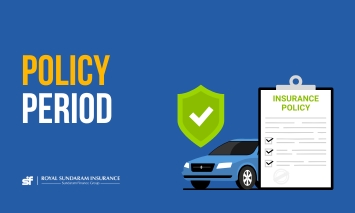What is NCB in Insurance? Learn Its Benefits and How It Works
Mar 31, 2025 • 15 Min Read
When it comes to insurance, many policyholders are unaware of the potential savings they can unlock simply by maintaining a claim-free record. By avoiding claims, you can unlock valuable discounts through a feature known as the No Claim Bonus (NCB). NCB is a reward from your insurer, for e.g. Royal Sundaram, for not making any claims during the policy period. In this blog, we will delve into what is NCB in insurance, how it works, and the significant advantages it can bring to your insurance experience.
What Does No Claim Bonus Mean?
No Claim Bonus (NCB) is a reward offered by insurance companies to policyholders for not making any claims during the policy period. It's their way of saying "thanks" for being a low-risk customer and rewarding safe and responsible behaviour, like careful driving in the case of motor insurance or maintaining good health in the case of health insurance. In other words, it is a discount on your insurance premium that increases each year you go without making a claim.
How Does NCB Work?
Accumulation of NCB
NCB comes into effect when you do not raise a claim against your insurance policy during the policy term. It starts accumulating after the first claim-free year, typically beginning at 20% of the premium.
This discount continues to increase with each subsequent claim-free year, usually by 5% to 10% per year, up to a certain limit. The maximum NCB can reach up to 50% after several consecutive years without a claim.
For example, if you don’t make a claim in the first year, you may receive a 20% discount on your premium at renewal. If you continue to make no claims, this discount could increase to 25% the following year, 35% after three years, and so on, up to the maximum limit of 50%.
Application on Premiums
The NCB is applied as a discount on the renewal premium of your insurance policy. For instance, if your policy’s premium is ₹10,000 and you have a 35% NCB, you would pay only ₹6,500/- at renewal.
Note: If you make a claim during the policy period, your NCB may drop or reset, depending on the insurance company’s policies.
NCB in Healthcare
In health insurance, the No Claim Bonus (NCB) works differently. Instead of lowering your premium, NCB increases your sum insured each year you stay claim-free, providing more coverage for the same premium.
For example, if your sum insured is ₹5 lakh and you don’t make any claims, it might increase by 10% to ₹5.5 lakh the following year. This enhanced coverage comes at no extra cost, as your premium remains the same. Essentially, NCB rewards you with higher coverage for maintaining a claim-free record.
Benefits of No Claim Bonus (NCB)
- With premium discounts, NCB leads to significant savings and makes your policies more affordable.
- As it acts as a reward for safe and responsible behaviour, it encourages policyholders to maintain good health or drive carefully.
- It accumulates over multiple years, providing increasing benefits as time goes on. This ensures long-term benefits for policyholders.
- It is typically transferable between insurers and policies, making it easy to switch insurance providers or buy a new vehicle without losing your benefits.
What is No Claims Bonus Protection?
NCB Protection is an optional add-on cover that you can purchase along with your insurance policy to safeguard your accumulated No Claims Bonus. Normally, if you make a claim, your NCB either reduces or resets to zero, meaning you lose the discount on your premium at the time of policy renewal. However, with NCB Protection, you can make a certain number of claims without losing your NCB, allowing you to retain the discount even after a claim.
In short, it provides an extra layer of security for your insurance premium discount, enabling you to keep the NCB discount on your premium even after making a claim. To avail of NCB Protection, you usually need to have accumulated a certain level of NCB, such as 20% or more. It comes at an additional premium, which varies based on the insurer and the vehicle being insured.
Tips for Managing NCB
- Maintaining a Claim-Free Record: Preserve and maximise your NCB by paying for minor repairs or expenses out of pocket rather than filing a claim. This helps maintain a claim-free record and enjoy the associated benefits.
- Utilising NCB Protection: By purchasing NCB protection from your insurer, you can retain your NCB even if you make a claim. It helps you preserve your benefits and enjoy peace of mind.
- Timely Renewal of Policies: Make sure to renew your insurance policy within the time frame specified by your insurer (usually 90 days) to avoid losing your accumulated NCB. Avoid lapsing, which might result in the forfeiture of your NCB.
- Updating Personal Details: Keep your personal information updated, such as a new address or contact information, to ensure that your policy records, including NCB, are accurate and up to date.
- Tracking NCB Accumulation: Maintain records of your claim-free years and NCB status. Keeping track will help you verify your NCB when transferring policies or renewing insurance.
- Understanding Policy Terms: Carefully read the policy document and be aware of the terms and conditions related to NCB in your policy. This is needed because rules regarding NCB accumulation, transferability, and impact of claims can vary with insurers.
Conclusion
Understanding what is NCB in insurance and how it works can significantly impact your overall insurance experience and help you make informed decisions that maximise your insurance advantages. Whether it's reducing your premiums in motor insurance or increasing your sum insured in health insurance, NCB provides significant long-term benefits. So, be aware and enjoy substantial savings while maintaining a strong insurance policy.



Discover the perfect insurance plan for you!
Get your free quote now!
Get StartedBy Clicking on Get Started, You agree to our Terms and Conditions and override DNC/NDNC registration.
More like this
View more





.png)